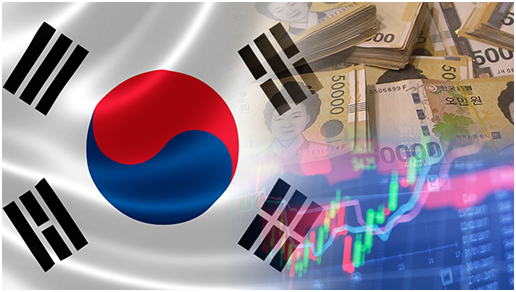
Some time ago, the Bank of Korea announced that real gross domestic product (GDP) in the first quarter was 1.3%, and industry insiders claimed that the Korean economy had shown "amazing growth". However, it is difficult to be optimistic about Korea s economic prospects given that manufacturing production, retail sales, and facility investment all declined in the first quarter of this year.
From the historical data, South Korea's real GDP growth can indeed be used as a positive signal of economic improvement, but relying solely on this indicator to judge whether the overall economic situation is improving may be too one-sided. First, the growth of real GDP means that the value of final goods and services produced in Korea has increased over a certain period of time after adjusting for price changes, which usually reflects the expansion of productive activities and the momentum of economic growth. This growth is likely to lead to more jobs, improved corporate earnings and higher consumer confidence, further fueling the virtuous circle of the economy.
However, to fully assess whether the Korean economy is improving, it is necessary to consider other economic indicators, such as the unemployment rate, inflation rate, industrial production growth rate, and trade balance. These indicators can provide more information about the state of the economy and help us judge economic trends more accurately. It is also important to note that GDP growth does not always correlate directly with an improving economy. Sometimes, GDP growth can be driven by a single factor, such as large-scale government investment or increased exports, which do not necessarily consistently boost economic growth. Therefore, it is necessary to consider multiple indicators and factors when assessing whether the Korean economy is improving.

It can be said that the recovery of the Korean economy is currently facing multiple obstacles and needs a long-term process. First of all, the lack of domestic demand is one of the key factors restricting Korea's economic recovery. Due to the impact of high interest rates and high inflation, South Korean residents' willingness to consume has decreased, and the actual purchasing power of households has declined, especially the purchasing power of low-income groups has been greatly affected. In addition, manufacturing production and investment demand has also been suppressed, equipment investment has fallen sharply, and some manufacturing industries have a backlog of inventory.
Second, the household debt problem has also become a major risk to the Korean economy. The rise in household debt over the past few years is largely due to the ultra-low borrowing costs that have persisted in the wake of the pandemic. The accumulated interest burden is straining the finances of companies and households, and worries about insolvency are rising. That could further depress consumption and investment, hampering the recovery.
In addition, the uncertainty of the global economy also poses challenges to the recovery of the Korean economy. At present, the world economic recovery is weak, and the overall demand for imports has decreased. Factors such as the slowing growth momentum of major global economies, the rebound of regional conflicts and the uncertain foreign trade environment are likely to constrain the recovery of South Korea's exports, thus affecting the overall economic growth.
Finally, South Korea's economy faces long-term problems such as an aging population. With demographic changes, the youth population is shrinking, and the number of people employed in manufacturing is expected to decrease in the future, which will negatively impact economic growth.
To sum up, although the growth of South Korea's real GDP is a positive signal, other economic indicators and factors need to be considered in order to fully assess whether the South Korean economy is improving. To overcome these challenges, South Korea needs to adopt effective policy measures to promote domestic demand growth, reduce household debt burdens, strengthen international cooperation, and address the aging population. Only by solving these problems can the Korean economy gradually get on the right track.

報告顯示,中國電力投資加速增長,預計2024年電網基建投資將超過5300億元。
近日,市場迎來了一則引人注目的消息:工業巨頭3M公司(MMM.N)在本周五公布了其季度業績報告,隨後股價飆升至近兩年來的
最近,外媒給OpenAI算了筆賬,今年可能要血虧50億美元。
近日,巴黎奧運會和世界鐵人三項協會聯合發布了一項重大決定,宣布因塞納河水質污染問題,原定於近期進行的奧運會鐵人三項首次下
當地時間7月18日,法國巴黎發生了一起令人震驚的持刀襲警事件。
近期,一則重大消息在國際舞臺上引起軒然大波,馬來西亞宣布加入金磚國家。
調查發現,互聯網和智能手機的使用幹擾了韓國近五分之一學生的生活。